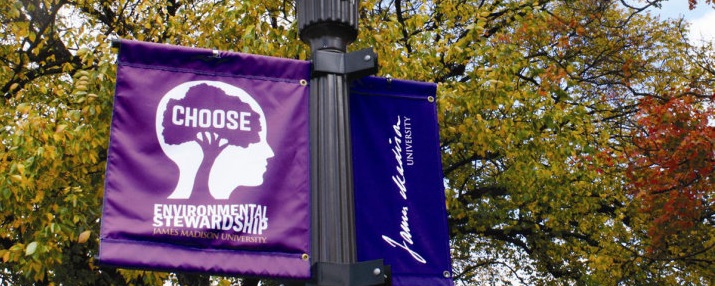
ENVIRONMENTAL STEWARDSHIP ACTION PLAN 2024-2026
President James Madison has been referred to by author Andrea Wulf as the “forgotten father of American environmentalism,” and fittingly, the JMU community has a long history of environmental stewardship. Individuals and our institution work independently and collaboratively to improve environmental quality and conserve natural resources and to advance sustainability through education, scholarship, engagement, and operations. The JMU Environmental Stewardship Action Plans (ESAP) 2011-2015, 2016-2020, and 2021-2023 communicated our university-wide strategic commitment and initiated more systematic tracking, coordination and recognition of the many environmental stewardship activities occurring. These videos, (2011-2015), (2016-2020), and (2021-2023) highlight accomplishments over those periods.
The following are the goals for 2024-2026:
|
JMU Strategic Plan Goal |
Core Quality - 3 Academic Quality: Outstanding Programs JMU Goal 3A: The university will foster student success by providing a holistic JMU Goal 3E: The university will develop programs that are responsive to the needs of the Commonwealth, the nation, and the world. |
|
ESAP Objective(s) |
Increase the number of students who perceive that our institution offers opportunities for students to develop awareness, knowledge, and understanding of environmental concepts. Increase the number of students who have adopted environmental stewardship practices. Increase students' awareness of the most pressing challenges facing the world today as articulated in the Sustainable Development Goals. Increase the number of students who indicate their JMU experience provided them with the knowledge and skills needed to make informed decisions about environmental sustainability challenges. Model environmental responsibility in the students’ everyday experience on campus, which is referred to as the “invisible curriculum” in the sustainability literature. Athletics, FM, and Dining Services will create sustainability plans for their areas and will track progress. |
|
JMU Strategic Plan Goal |
Core Quality - 7 Engagement JMU Goal 7C: The university supports students’ skill development through engaged learning. |
|
ESAP Objective(s) |
Increase the number of students the ISNW supports participating in a high impact practice related to the environment such as global learning, e-portfolios, first-year seminars, internships, learning communities, service projects, undergraduate research, conference presentations, or writing-intensive courses. |
|
JMU Strategic Plan Goal |
Core Quality - 7 Engagement Goal 7A: The university will address community priorities by being deeply embedded in local, regional and global communities through mutually beneficial and reciprocal partnerships to create student learning opportunities and align institutional practices. |
|
ESAP Objective(s) |
Increase the number of students who indicate that JMU builds sustainable community through partnerships, service, and outreach. Increase community capacity for tackling environmental resources by facilitating access to JMU resources. |
The process for identifying objectives for the ESAP was evidence-based and stakeholder-driven, using information from the JMU Continuing Student Surveys - CSS (2022), the National Survey of Student Engagement - NSSE (2017), and the Sustainability Assessment Questionnaire - SAQ (2020)*. Final selection of recommended objectives was made based on those that align with JMU’s strategic plan and membership in the University Global Coalition, which includes a commitment to increasing students’ understanding of the pressing environmental challenges facing the world today and inspiring students to play an active role in driving change and finding new solutions. Accordingly, the objectives focus on increasing students’ awareness of and participation in engaged learning and community engagement opportunities related to environmental stewardship and sustainability.
